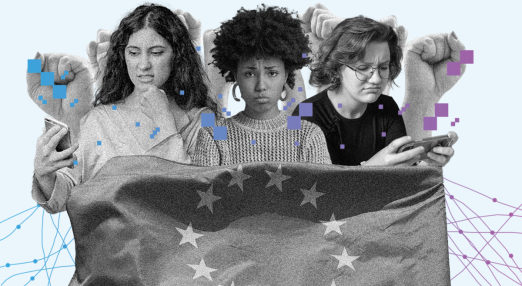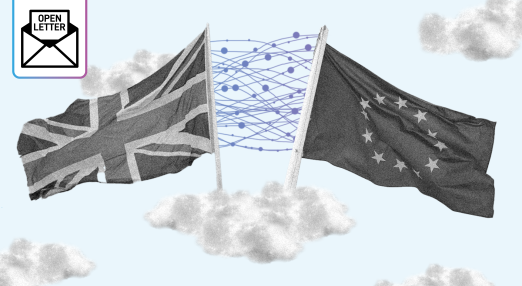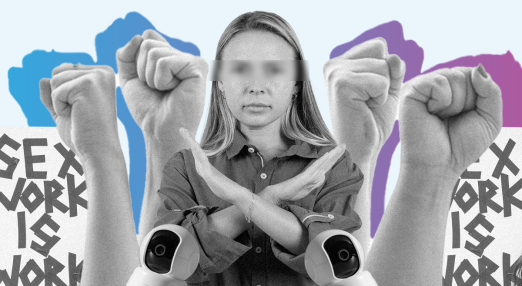Our work
EDRi is the biggest European network defending rights and freedoms online. We work to to challenge private and state actors who abuse their power to control or manipulate the public. We do so by advocating for robust and enforced laws, informing and mobilising people, promoting a healthy and accountable technology market, and building a movement of organisations and individuals committed to digital rights and freedoms in a connected world.
Filter resources
-

French Administrative Supreme Court illegitimately buries the debate over internet censorship law
In November 2023, EDRi and members filed a complaint against the French decree implementing the EU regulation addressing the dissemination of 'terrorist content' online. Last week, the French supreme administrative court rejected our arguments and refused to refer the case to the Court of Justice of the European Union.
Read more
-

The EU must stop the digitalisation of the deportation regime and withdraw the new Return Regulation
The European Commission’s new legislative proposal for a deportation regulation fuels detention, criminalisation, and digital surveillance. The #ProtectNotSurveil coalition is demanding the end of the deportation regime and for the Commission to withdraw its proposal.
Read more
-

Spyware and state abuse: The case for an EU-wide ban
EDRi’s position paper addresses the challenges posed by state use of spyware in the EU. It also tackles how spyware should be legally defined in a way that shields us from future harms, as well as the dangers of the proliferation of commercial spyware in Europe. After conducting a values-based analysis into spyware, the paper concludes that the only human-rights compliant approach is a full ban.
Read more
-

EDRi-gram, 12 June 2025
What has the EDRis network been up to over the past two weeks? Find out the latest digital rights news in our bi-weekly newsletter. In this edition: UK data adequacy under scrutiny, ProtectEU strategy a step further towards digital dystopia, and more!
Read more
-

All Eyes on my Period? Period tracking apps and the future of privacy in a post-Roe world
Privacy International investigated eight of the most popular period-tracking apps to analyse how they function and process users’ reproductive health data. Their findings raised concerns for users’ privacy, given the sensitive nature of the health data involved. These findings come within the context of the global roll back on reproductive rights and fears over law enforcement forcing apps to hand over data.
Read more
-

LIBE vote on Europol reform blow to the Commission, but still legitimises an expanding surveillance regime
European Parliament's LIBE committee vote on a reform of the Europol Regulation was a mixed bag. Although it was a blow to the European Commission's original proposal, it still legitimised an expanding surveillance regime thanks to Europol's ever-growing power and resources. Read the Protect Not Surveil coalition’s statement.
Read more
-

Why the EU’s GDPR ‘simplification’ reforms could unravel hard-won protections
Since it came into force almost seven years ago, the European Union (EU)'s General Data Protection Regulation (GDPR) has set the global standard for data protection. It empowers people to control their personal data while holding businesses accountable for how they collect, process, and store that data. One would imagine that all of the above would cement the GDPR, but this crucial law is being threatened by a push for profit at any cost.
Read more
-

UK data adequacy under scrutiny: civil society warns EU not to reward deregulation disguised as ‘simplification’
Civil society organisations, including EDRi and EDRi members Open Rights Group and Privacy International, are urging the European Commission not to re-adopt the UK’s data adequacy decisions without meaningful reform. The UK’s rollback of protections under the guise of ‘simplification’ puts the level of protection required by the General Data Protection Regulation (GDPR) and Court of Justice of the European Union (CJEU) case law at risk and exposes the Commission’s decisions to legal challenge.
Read more
-

EDRi-gram, 28 May 2025
What has the EDRis network been up to over the past two weeks? Find out the latest digital rights news in our bi-weekly newsletter. In this edition: Reopening the GDPR is a threat to our rights, 6 years of fighting censorship by Meta in Poland, & more!
Read more
-

Croatia in preparation for AI Law: Activists warn of risks to rights and call for safeguards going beyond EU AI Act
EDRi affiliate Politiscope recently hosted an event in Croatia for journalists and activists to discuss human rights impact of Artificial Intelligence (AI), raise awareness about AI related harms, and to influence future national policy to incorporate safeguards for people’s rights.
Read more
-

Sweden further cracks down on sex workers: What it means for digital rights
Despite overwhelming opposition from civil society, academic experts, and sex workers, the Swedish Parliament voted to adopt a law that expand the criminalisation of sex work. This will have have a chilling effect nationally and internationally, and affect digital rights.
Read more
-

Six years in court fighting against arbitrary censorship. What about user empowerment promised by the DSA?
Regardless of the final court judgment, this case highlights the urgent need for Poland to implement the DSA. Without its enforcement, users of the largest social media platforms — whether private individuals or CSOs — still stand little chance against the dominance of tech giants.
Read more
